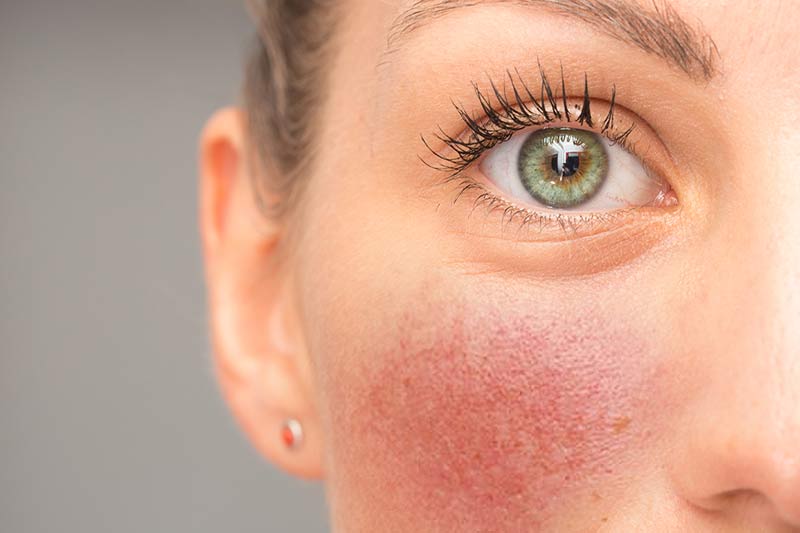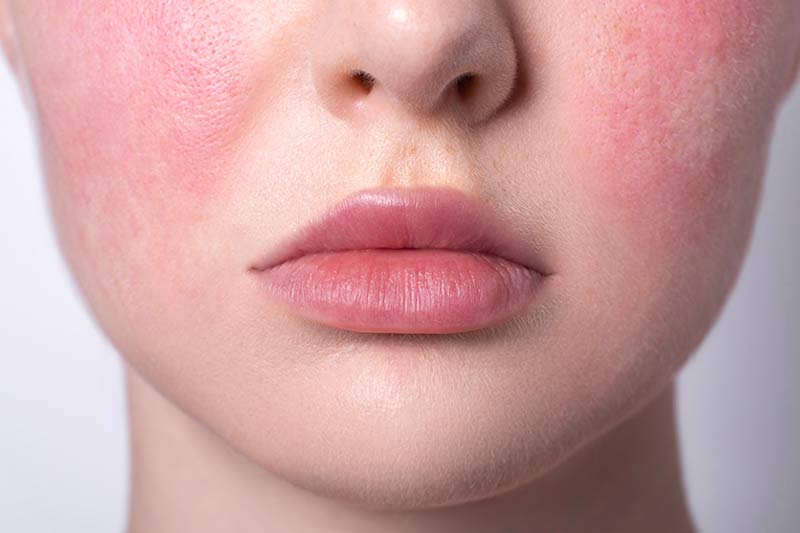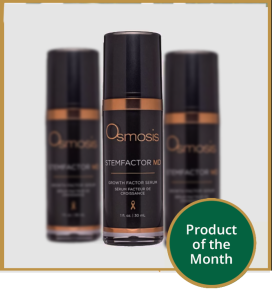From wrinkles and hyperpigmentation to acne and inflammation, many people experience skin issues that lower their self-esteem and sometimes lead to more severe health concerns. Rosacea is such a skin condition, affecting millions of people worldwide.
This article explains what rosacea is, what triggers the symptoms, and which treatments can help soothe flare-ups.

What Is Rosacea?
Rosacea is an inflammatory skin condition characterized by flare-ups that come and go in cycles. The symptoms are unpredictable in duration and severity – sometimes mild and sometimes extreme.
The condition is not life-threatening but may have severe psychological effects, including depression. That is why doctors recommend treating the symptoms as soon as they appear and complying with the prescribed therapy.
Symptoms of Rosacea
Rosacea symptoms may appear alone or in combination. They include the following:
- Redness – It typically affects the central facial area, including the nose, cheeks, chin, and forehead. Patients experience temporary flushing initially, but if the symptoms are left untreated, it can cause permanent redness. This symptom is difficult to spot on darker skin tones.
- Burning and stinging – Flushing, redness, and other symptoms are sometimes accompanied by a burning and stinging sensation.
- Rough, scaly skin – Patients may develop patches of dry, rough, and scaly skin.
- Skin thickening – It usually affects the nose and is due to earlier active and untreated redness. It gives the nose a swollen, bulbous appearance. The skin can also thicken on other facial areas, but it rarely happens.
- Papules and pustules – These are puss-filled acne that appear on the central facial area.
- Spider veins – Rosacea may cause small blood veins to break and appear on the nose and cheeks.
- Eye irritation – Eye symptoms are called ocular rosacea. They include eye redness, swelling, pain, bumps and broken blood vessels on the eyelids, and vision problems.
Rosacea symptoms typically appear on the central facial area, but sometimes they affect the neck, chest, ears, and scalp.
Who Can Get Rosacea?
Anyone can get rosacea, but evidence suggests the following groups are more likely to experience it:
- White women over the age of 30
- People with a family history of rosacea
- People with a history of acne cysts and nodules
- People who smoke
The condition is not contagious.
What Causes Rosacea?
Medical experts still don’t know the exact causes of rosacea, but they suspect these possible contributing factors:
- Genetic predisposition
- Inflammation
- Increased sensitivity to mites that live on the skin (Demodex folliculorum)
- Increased sensitivity to environmental stressors (most commonly UV radiation)
- Intestinal infection caused by H. pylori bacteria
Scientists have also identified triggers that can aggravate the condition:
- Stress
- Spicy food
- Alcohol
- Caffeine
- Nicotine
- Too much strenuous exercise
- Hot and cold climate
- Harsh skincare products
- Medications that dilate blood vessels
How Is Rosacea Diagnosed?
There are no tests specifically for rosacea. Doctors diagnose the condition based on skin and eye examinations, a discussion about the patient’s symptoms, and their previous medical history. Sometimes, doctors test patients for other medical concerns, such as lupus, psoriasis, and menopause, to rule out conditions with similar symptoms.
Rosacea Treatments
There is no permanent cure for rosacea, but various treatments can help mitigate the symptoms and prevent rosacea from worsening.
Medications
Doctors prescribe the following medications based on rosacea symptoms:
- Brimonidine and oxymetazoline (prescription gel and cream for redness)
- Alpha and beta blockers (medications for flushing)
- Isotretinoin (oral medication for skin thickening)
- Doxycycline, tetracycline (oral antibiotics for skin thickening, bumps, and pimples)
- Ivermectin, azelaic acid, and metronidazole (topical creams for acne)
- Topical retinoids (for severe rosacea symptoms)
- Eye drops and medications (for ocular rosacea)
They often combine oral therapy with other treatments.
Holistic Treatments

A holistic facial is a cosmetic treatment involving gentle facial massage, aromatherapy, and the use of natural skincare products to stabilize triggers that cause flare-ups. The treatment can help reduce stress, remove toxins, and enhance circulation, improving skin health.
Other holistic skincare options to ease rosacea symptoms include:
Osmosis MD Deep Clean – A detox cleansing solution with citrus essential oils and coconut, suitable for sensitive skin. Apply one pump on damp skin and gently massage.
Osmosis MD Rescue – A serum with patented formula containing Trioxolane, a stable oxygen molecule that helps to neutralize toxins, enhance skin integrity, and reduce inflammation. Apply 1-2 pumps on clean skin twice daily.
Vibrant CBD Mask – A face mask infused with CBD, a potent anti-inflammatory ingredient, and aloe vera, which soothes the skin. Together, they help relieve rosacea symptoms and enhance skin immunity.
Photofacial
Photofacial is a cosmetic treatment involving the use of laser and intense pulsed light devices (such as IPL and BBL) to improve various skin conditions. For rosacea patients, photofacials can help shrink enlarged blood vessels, decrease flushing and redness, and remove thickened skin.
Vibrant Skin Bar offers laser photofacial therapy for the cost of $350/session.
Oxygen Facial
Oxygen facial is a non-invasive facial treatment that uses a wand-like device to deliver high-pressurized oxygen to the skin, plumping and rejuvenating the complexion. It deeply hydrates and cleanses the pores of sebum, dirt, bacteria, and other impurities, reducing rosacea triggers.
At Vibrant Skin Bar, the oxygen infusion facial costs $165 per session.
Jet Plasma
Jet plasma is a non-invasive, gentle treatment for skin issues such as rosacea, melasma, acne, hyperpigmentation, and signs of premature aging skin. It uses a handheld device to send ionized gas to the skin, causing superficial injuries and promoting collagen production. It has a lifting and tightening effect while calming the skin.
At Vibrant Skin Bar, one jet plasma session costs $2,500.
Note: For more options, refer to our guide to natural treatments for rosacea.
Sun Protection
People with rosacea have very sensitive skin, and sun exposure is often one of the primary triggers of flare-ups.
Protect the skin all year round with adequate clothing, wide-brimmed hats, and broad-spectrum, 30+ SPF sunscreen. Mineral sunscreens with zinc oxide, titanium dioxide, or both are less likely to cause irritation.
Note: Check out our tips on how to choose sunscreen or discover our selection of the best sunscreen products.
Gentle Skincare
Sensitive rosacea skin is easily irritated with harsh skincare products. Choose mild cleansers, creams, and serums with natural ingredients, such as soothing botanicals and essential oils that reduce inflammation.
Apply products to your face gently using only your fingertips and rinse with lukewarm water. Never rub your face with a towel, but gently pat it. Avoid deodorant soaps, toners, exfoliants, and alcohol-based products.
Products like Osmosis MD Skin Perfection Elixir are specifically formulated to reduce inflammation, redness, and other rosacea symptoms.
Balanced Nutrition
Poor gut health and a disrupted microbiome balance may cause rosacea. Health experts recommend patients modify their diet during treatment to eliminate potential rosacea triggers in food.
Anti-inflammatory meal plans based on vegetables, fruits, whole grains, and healthy fats, such as the Mediterranean diet, are typically prescribed for rosacea.
To ensure you choose the right foods and avoid those that cause flare-ups, we recommend food intolerance testing. Food intolerance can be determined with blood tests, a breath test for lactose intolerance, or a special diet that involves avoiding certain foods for a period to see if symptoms get better. Common food triggers include lactose, gluten, food colorings and preservatives, sulfites, histamines, etc.
Medical providers also recommend stool testing to determine the patient’s sensitivity to intestinal bacteria and see if medications are required.
Dietary supplements are a great way to enhance the effects of a balanced diet and mitigate rosacea symptoms. We recommend two:
Vibrant Biome – A probiotic formulated to reduce redness and inflammation by supporting healthy flora in the GI tract. Take one sphere daily with meal.
Vibrant Digest – Contains digestive enzymes that support the digestion of proteins, carbs, and fats. Take one capsule daily with a meal.
Avoid Alcohol
Alcohol acts as a vasodilator, relaxing and widening blood vessels, and worsens rosacea symptoms. Doctors recommend eliminating or limiting alcohol intake to avoid flushing and redness.
When Can You See the Results?
The time to first results depends on the type of rosacea treatment and the severity of the symptoms.
Photofacials provide gradual results. Patients may see slight improvements in their condition within a week and full effects after several weeks. The results are long-lasting but usually require several treatments.
Topical creams for acne usually yield results after two to six weeks.
Brimodine and oxymetazoline provide immediate symptom relief but have a temporary effect (up to 12 hours). Patients need to use them for as long as redness persists.
Conclusion
Rosacea is an unpleasant skin condition that affects patients’ confidence and daily life. Though the medical community is still working to understand its root causes fully, they have developed various highly effective treatment options.
Discuss the possible solutions for rosacea with a certified medical practitioner and follow their advice precisely to ensure you get symptoms under control.




